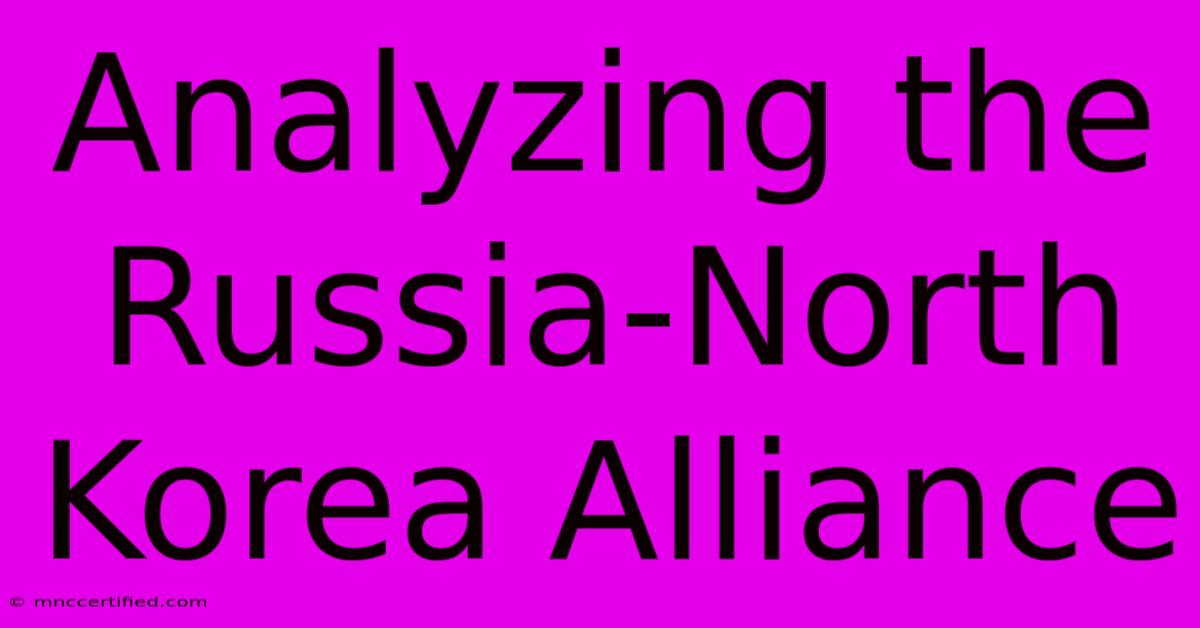Analyzing The Russia-North Korea Alliance

Table of Contents
Analyzing the Russia-North Korea Alliance: A Deep Dive into Geopolitical Shifts
The burgeoning relationship between Russia and North Korea presents a complex and evolving geopolitical landscape. This alliance, driven by mutual benefit and shared grievances against the West, demands careful analysis to understand its implications for regional and global stability. This article delves into the key aspects of this partnership, exploring its historical context, current dynamics, and potential future trajectories.
Historical Context: A Shifting Sands Relationship
The relationship between Russia and North Korea has been marked by periods of both cooperation and tension. Initially forged in the aftermath of the Korean War, the Soviet Union provided crucial support to the nascent North Korean regime. However, the collapse of the Soviet Union in 1991 led to a period of decreased interaction.
The Rise of Pragmatism:
The 21st century has witnessed a resurgence in the relationship, characterized by a pragmatic approach on both sides. Economic hardship in North Korea and Russia's desire to diversify its international partnerships have created fertile ground for collaboration. This pragmatic shift signifies a departure from the ideological ties of the Cold War era.
Current Dynamics: Mutual Benefits and Shared Grievances
The current Russia-North Korea alliance is rooted in mutual benefits and a shared antagonism towards the West. Russia seeks to:
- Counter Western Influence: By strengthening ties with North Korea, Russia aims to undermine US influence in the region and challenge Western sanctions. This aligns with Russia's broader geopolitical strategy of challenging the existing global order.
- Access Resources and Markets: North Korea offers potential access to minerals and other resources, while Russia can provide vital energy and technological assistance. This economic cooperation provides mutual benefits, albeit limited in scale due to sanctions.
- Military Cooperation: Reports of increased military cooperation between the two countries raise concerns about potential arms transfers and joint military exercises. This strengthens both nations' military capabilities and presents a challenge to regional security.
North Korea, on the other hand, benefits from:
- Economic Support: Russia offers a lifeline of economic assistance, providing a crucial counterweight to international sanctions imposed on Pyongyang.
- Technological Assistance: Access to Russian technology can help North Korea advance its military and industrial capabilities, further bolstering its defiance against international pressure.
- Diplomatic Support: Russia provides a degree of diplomatic cover for North Korea on the international stage, mitigating the impact of isolation.
Potential Future Trajectories: Uncertainty and Risk
Predicting the future trajectory of the Russia-North Korea alliance is fraught with uncertainty. While the current partnership appears mutually beneficial, several factors could alter the dynamic:
- Sanctions and International Pressure: Increased sanctions pressure on both countries could strain their relationship, leading to instability.
- Internal Political Changes: Changes in leadership in either Russia or North Korea could significantly impact the alliance's trajectory.
- Regional Dynamics: The evolving geopolitical landscape in Northeast Asia, particularly the relationship between North Korea and China, will play a key role in shaping the future of the partnership.
Risks and Implications:
The strengthening Russia-North Korea alliance poses several risks:
- Increased Regional Instability: The potential for increased arms transfers and military cooperation could destabilize Northeast Asia, raising the risk of conflict.
- Nuclear Proliferation: The alliance could facilitate North Korea's nuclear weapons program, further exacerbating global security concerns.
- Undermining International Norms: The alliance challenges international efforts to address North Korea's human rights abuses and its nuclear program.
Conclusion: A Complex and Evolving Relationship
The Russia-North Korea alliance is a multifaceted and dynamic relationship, characterized by mutual benefits and shared grievances. Understanding its historical context, current dynamics, and potential future trajectories is crucial for navigating the complex geopolitical landscape of Northeast Asia. The alliance presents significant risks and challenges to regional and global security, demanding careful monitoring and proactive diplomatic engagement from the international community. Further research into the specifics of trade agreements, military cooperation details, and the potential impact on neighboring countries is vital for a comprehensive understanding of this evolving situation. The continued analysis of this relationship is critical to anticipating future developments and mitigating potential risks.

Thank you for visiting our website wich cover about Analyzing The Russia-North Korea Alliance. We hope the information provided has been useful to you. Feel free to contact us if you have any questions or need further assistance. See you next time and dont miss to bookmark.
Featured Posts
-
Australia Sweeps Pakistan Zampa Stoinis Star
Nov 19, 2024
-
Starmer Backs Strong Uk China Links
Nov 19, 2024
-
Dune Prophecy Episode 1 Hidden Details
Nov 19, 2024
-
St Augustine Homeowners Insurance
Nov 19, 2024
-
3rd T20 I Highlights Australia Wins
Nov 19, 2024